What Is the Best Marine Battery?

What Is the Best Marine Battery?
The best marine batteries for you depend on what types of boating you want to do. Are you planning to go out for a day to pull your kids on water skis? Are you trolling for trophy fish on the water from sunrise until sunset? Or, perhaps your boat is your home. All of these applications put different demands on the boat battery. Let’s go to look at how this impacts your choice of the best boat battery for you and what options are available. From this blog, you will learn what battery fits your boat.
What is Special about Marine Batteries for Boats?
Your car battery's main job is to provide enough power to turn over or start your engine when it's cold. To do this, the batteries need to deliver a lot of amperages for just a few seconds. After the engine starts, the alternator takes over to power all of the electronics in your car and it can self-recharge the battery.
Marine boat battery often has different demands on them. Your boat motor still needs a cranking battery to start it, but there may be many other appliances need that the battery will supply. In smaller, day-use boats, marine batteries must also power the lights, pumps, gauges, or other electric appliances. On the other hand, fishing boats or live-aboard vessels may require multiple battery types to run household systems and electric motors.
There are three general types of boat batteries to consider: Starting boat battery, deep-cycle marine battery, and multi-purpose boat battery.
Starting Boat Battery and Deep Cycle Marine Battery
Starting boat battery is similar to the starting battery in your car. This battery provides a short burst of power (cranking amps) to start your boat motor. Draining the starting battery below 50% will causes damage to it and shortens its lifespan.
A deep-cycle marine battery is able to be drained slowly over long periods. Depending on the type of deep-cycle batteries, you can repeatedly drain them to 80 percent or more of their capacity without causing damage. This is called deep cycling. However, a deep-cycle battery cannot provide the cranking amps needed to start large motors.
Multi-purpose boat batteries combine some of the benefits of starting batteries and deep-cycle batteries. The construction of the multi-purpose batteries allows it to start very small boat motors while also powering lights and gauges that don’t draw a lot of power.
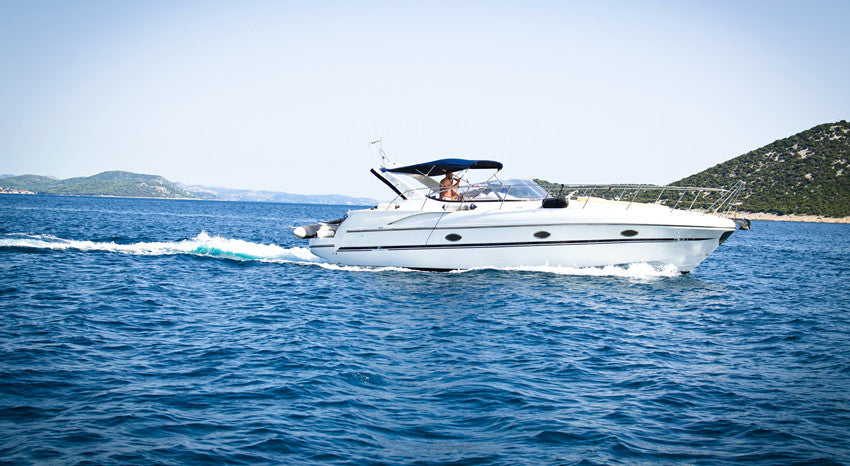
How Boats Use Batteries
There are typically three types of boat power and batteries system to consider when you are selecting the best boat battery.
Single Multi-Purpose Marine Battery Bank
For all types of batteries, the single multi-purpose battery bank's system is the simplest. Multi-purpose batteries system are common in day-use boats, like speed boats or for general recreation boats. The batteries' main purpose is to start the trolling motor and maybe power a radio or running lights if it gets dark on you. The sustained power draw on the batteries is very low, and you typically would not be draining it enough to cause damage. Accidently leaving lights on or running the radio too long could damage the battery however and leave you stranded, and unable to start your engine. So this is a multi-purpose boat battery.
Separate Starting Battery & Trolling Motor Battery
A dedicated fishing boat with a trolling motor requires a starting battery and a deep-cycle trolling marine battery. If you are trying to power a trolling motor all day on a starting or a multi-purpose battery would not work. Not only would the battery drain quickly, deep cycling a starting battery or multi-purpose battery damage the battery. This could also make you stranded because your trolling motor could kill your starting battery.
Separate Starting Battery & House System Boat Battery Banks
Live-aboard vessels such as sailboats, catamarans, houseboats and also require multiple battery types. Like most boats, they need a starting battery to start the motor, and a deep-cycle battery to run the boat over long periods.
Unlike recreational boat and fishing boat, live-aboard boats need batteries system to provide power to all of the electronics and appliances that you need for daily living. Appliances include lights, fans, DC appliance power and possibly inverters. In many ways, a houseboat system batteries banks is no different than batteries system for an off-grid home or an RV.
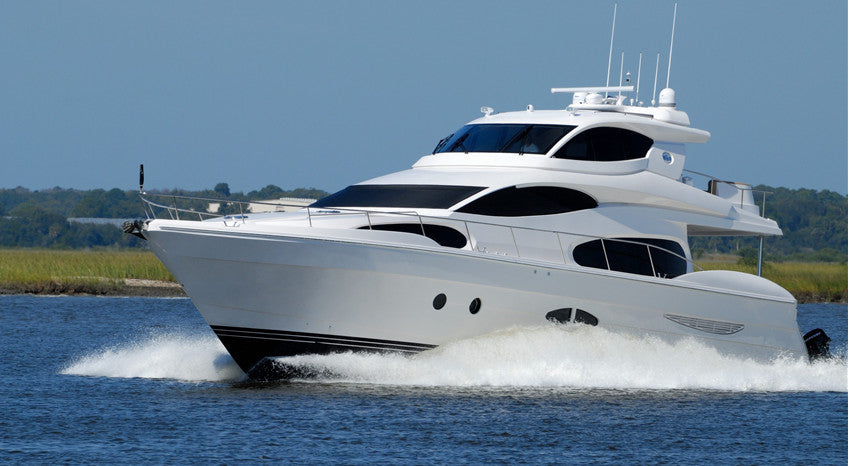
What to Look for When you are shopping for the Best Boat Battery?
Your application will help to determine if you need a starting battery, a deep-cycle battery system, or maybe you only need a single multi-purpose battery for your boat. The best marine boat batteries for you will always depend on how you are using them. Regardless of your applications, there are some things to keep in mind when looking for any marine boat battery.
Efficiency is critical. Efficiency in a battery means that you are able to discharge your battery to 80 per cent or more of its capacity without damaging it and then recharge it quickly.
Reliability and lifespan are also essential to consider when you are selecting marine batteries. You don't want to be a few miles off-shore on a fishing trip and not be able to start up your trolling motor to get home because your batteries are dead. Likewise, you can imagine taking friends out on your sailboat for a weekend and having your battery system croak on you. That will be not going to make for a fun vacation. Beyond that, batteries are expensive. you are having to replace them frequently because they do not have a long lifespan or the warranty will add up quickly.
And last, but certainly not least, the battery's weight. Batteries could be very heavy. This will become a significant consideration in live-aboard and trolling battery systems where you likely need multiple batteries to provide the capacity you need.
Ultimately, you are looking for the lightest, most efficient, and most reliable battery you can afford. Let’s go to look at some options.
Types of Deep-Cycle Boat Batteries
Lead-Acid Deep Cycle Boat Batteries
Lead-acid deep-cycle marine boat batteries come in two main varieties: flooded lead-acid (FLA), and absorbent glass mat (AGM).
Flooded lead-acid battery is the most basic type of lead-acid batteries. this battery contains a sulfuric acid solution with lead plates suspended in it. You have to monitor them continually and periodically add water to the batteries to keep them operating correctly.
An absorbent glass mat battery is also sometimes referred to as a sealed lead-acid battery. As this name implies, the battery is sealed and does not require the same maintenance as the FLA battery. AGM battery also has lead plates in it, but it sits between electrolyte-saturated fiberglass sheets.
Pros
The Lead-acid battery is the most common and readily available type of deep-cycle battery. Since lead-acid batteries are readily available, they are usually pretty easy to find a replacement if you need one. They also have the lowest upfront cost, which can be enticing to people who have a limited budget.
The lead-acid battery does not have any electronics in it, which allows it to provide a large amount of current. This makes the lead-acid battery a good option for starting batteries.
Cons
The lead-acid battery has a few major drawbacks. The first is that it requires more maintenance than other deep-cycle batteries to ensure it remains in peak working condition. While AGM battery doesn't need the same maintenance as FLA battery, the lead-acid battery cost significantly more without adding any additional capacity.
A deep-cycle lead-acid battery should not be discharged below 50 percent of its capacity. Doing so will damage the lead-acid battery. In addition, as the lead-acid battery discharge, its voltage also drops. Combining these two factors means that the lead-acid battery is typically only getting about half of the rated capacity out of a lead-acid battery.
While a deep-cycle lead-acid battery has the lowest initial cost, it has the shortest lifespan, lasting only 2-4 years. Because of the lead plates, the lead-acid battery is very heavy, which is not a good ideal for boating applications where weight is a vital concern. Additionally, the lead acid is not safe on the marine boat, because it is able to heat during working. Lastly, the FLA battery is not sealed, so you have to install it upright to prevent the acid solution from leaking.
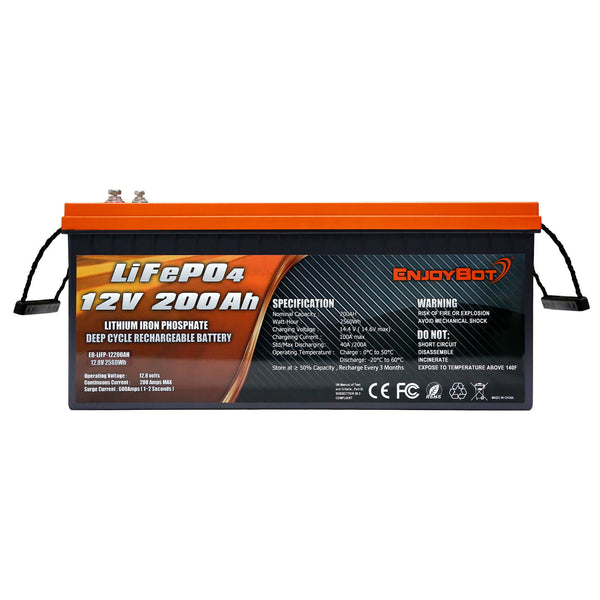
Lithium-Iron Deep Cycle Boat Battery
Lithium-iron deep-cycle batteries use lithium salt and iron salt to store energy instead of sulfuric acid and lead plates. This lithium battery is relatively new and is still the most expensive type of deep-cycle battery. However, its high upfront cost is often justified by its many advantages, especially in boating applications.
Pros
You can drain lithium-iron phosphate deep-cycle marine boat batteries to 80%- 98% of their capacity without damaging them. Using the proper charge controller, the lithium battery charge will be much faster than lead-acid battery. This combination makes lithium marine batteries much more efficient than the lead-acid counterparts.
Lithium-iron phosphate batteries have an integrated battery management system (referred to as BMS) that monitors the battery’s health and eliminates the need for periodic maintenance. The BMS also optimized charging and discharging across the battery’s cells and ensures the battery is always operating within its safe limits. These features result in the lifespan of a lithium-iron-phosphate battery being 2-5 times that of a lead-acid battery.
Lithium-iron phosphate deep-cycle marine batteries do not contain heavy lead plates and weigh about half what lead-acid batteries of the same capacity do. As we mentioned before, this is a massive of advantage in a boat.
Cons
The biggest disadvantage of lithium-iron marine batteries is their initial upfront cost. However, you often end up saving money in the long run since they usually last at least 5 times longer than traditional lead-acid batteries.
One other thing to consider is that the maximum amperage output of a lithium-iron marine battery is much less than a lead-acid battery. This means that a lithium-iron battery is not a good option for a starting battery where you need high cranking amps.
The Best Marine Battery For Your Use
Your particular application will determine which type of marine battery is best for you. However, a lithium-iron-phosphate marine battery will be your best option for any applications where deep cycling is required. The only time a lithium-iron marine battery won’t outperform a lead-acid battery in efficiency, reliability, overall cost, and weight is when you need a starting battery.
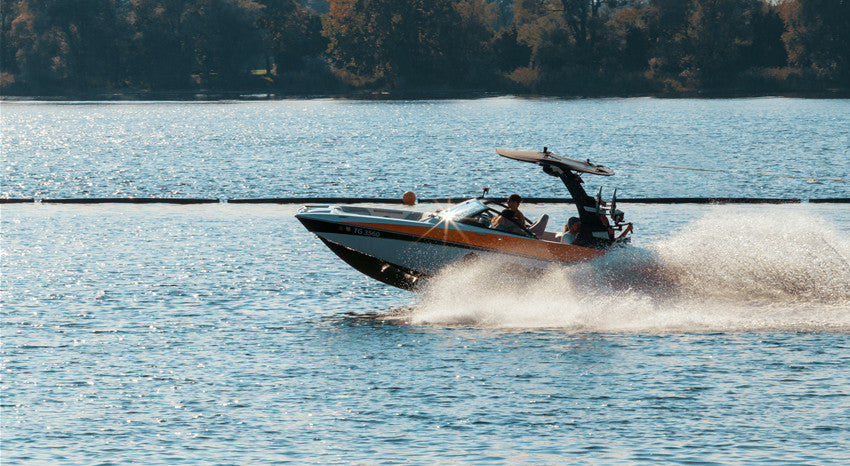
What battery is recommended for a boat?
In most cases, a lithium iron phosphate battery is what you need. If your boat is a bass boat or bigger, 12 voltage marine battery is your best bet.
Does a marine battery really necessary for my boat?
If you need a boat starting battery, A marine cranking battery is a great option. The cranking battery allows a marine vessel to start by delivering power to the engine when the ignition switch is activated. For this reason, this cranking battery is also known as starter battery.
What's the difference between marine and regular batteries?
Unlike a car battery which generally travels on smooth, sealed roads, a marine battery must be able to resist vibration from wave pounding and trailer transport. Repeated vibration and wave impact on the non-marine battery can cause damage and cracks to appear in the battery's internal components and outer case. The Enjoybot LiFePO4 marine battery packs have been through a rigorous testing procedure by UN certified inspectors, afford the quality to meet your power needs no matter the system you use.
How do I choose a boat battery?
batteries' capacity (Ah rating) batteries' group, batteries' physical size, (make sure the battery perfectly fits in the battery box) weight, (choose the batteries with average weight to be able to move them in and out), and output (marine cranking amp rating, reserve capacity rating, cold cranking amp rating).
What does 160 RC mean on a battery?
160 RC means reserve capacity, it helps to power your vehicle's electrical systems if the alternator fails. The RC identifies how many minutes the battery can supply ample power without falling below the minimum volt needed to run your vehicle.
Why do boat batteries go dead?
The reason is that the engine can drain the battery. The engine will go running when the engine uses electricity to operate the ignition system. If there is an issue with the charging system, the engine will use up the battery to run. Once the battery is drained, the engine will cut off and won't run.
How long does a marine battery usually last?
It is depending on what type of battery you use. A common marine battery will last from 2 to 4 years. The frequency with which you charge the battery and whether or not you run the trolling motor heavily will affect how long your marine battery lasts. A marine battery can last for over 4 years with proper care and maintenance. If you choose an Enjoybot LifePO4 battery (Lithium-iron phosphate battery), you don't need to replace batteries for 10 years.
Can I use car batteries in the boat?
You need to be aware of the fact that car batteries won't last as long as marine batteries in a boat. This is because car batteries are not designed to be used in the boat. Marine batteries are designed to be used in the boat and they will last longer than car batteries.
Do marine batteries need maintenance?
It is depending on what kind of batteries you use.
If LifePo4 batteries, you do not spend much time on maintenance, just keep them completely discharged and fully charged.
Do LiFePO4 batteries safe on a boat?
Yes, lithium-iron phosphate (LiFePO4) batteries are safest for marine and boat applications. Usually, the LiFePO4 battery is sealed, which means that a bit of water splashing on them won't cause harm. In addition, lithium-iron phosphate batteries have an internal battery management system (referred to as BMS).
Do lithium-iron phosphate batteries good for boats?
That is why so many people appreciate installing lithium-iron phosphate batteries on their boats. The lithium iron phosphate boat battery takes full charge of starting your outboard, powering your trolling motor, and providing the juice to your electronics. See more details about lithium batteries.
Do LiFePO4 batteries better than lithium-ion batteries?
LiFePO4 batteries have the edge over lithium-ion batteries, both in terms of cycle life (it lasts 4-5x longer) and safety. This is a key advantage because lithium-ion batteries can overheat and even catch fire, while LiFePO4 batteries do not.
Will lithium-iron phosphate batteries make my boat faster?
One of the easiest ways to improve fuel efficiency is reducing a boat's weight. With a lightweight lithium-iron phosphate battery, you do not have to sacrifice as much of your gear to achieve greater fuel economy. Heavy lead-acid batteries will only slow the boat down.
What is the best lithium battery for my boat?
LiFePO4 batteries are the safest type of lithium iron phosphate batteries for boats. As they won't overheat, and even if punctured they won't catch on fire. The cathode material in the lithium-iron phosphate batteries is not hazardous, so poses no negative health hazards or environmental hazards.
I highly recommended Enjoybot lithium-iron phosphate (LifePO4)deep cycle marine battery. Because Enjoybot lifePO4 battery has longer run time, longer lifespan, weighs less, more efficient power & charging, built-in battery management system(BMS), 10 years warranty.
Can I charge a LiFePO4 battery with a common charger?
Do I need a special charger for a lithium-iron-phosphate battery?
Yes, you need use a lithium iron phosphate 4-string (14.6V) charger to charge the battery pack.
To fully charge a 12v LiFePO4 battery, you should take a charger with a voltage of 14V to 14.6V is required.
What is the advantage of the LiFePO4 battery?
Lithium iron phosphate battery (LiFePO4 or LFP) offers lots of benefits compared to the lead-acid battery and other lithium batteries. Longer life span, no maintenance, extremely safe, lightweight, faster charging, cheaper in a long term, improved discharge and charge efficiency, just to name a few.
Do lithium-iron phosphate batteries safe for bass boats?
Yes, lithium-iron phosphate (LifePO4) batteries are currently the safest and most reliable form of lithium battery.
How far can I discharge a LiFePO4 battery?
LiFePO4 batteries can be continually discharged to 100% DOD and there is no long-term effect. However, we recommend you only discharge down to 80% to maintain battery life.
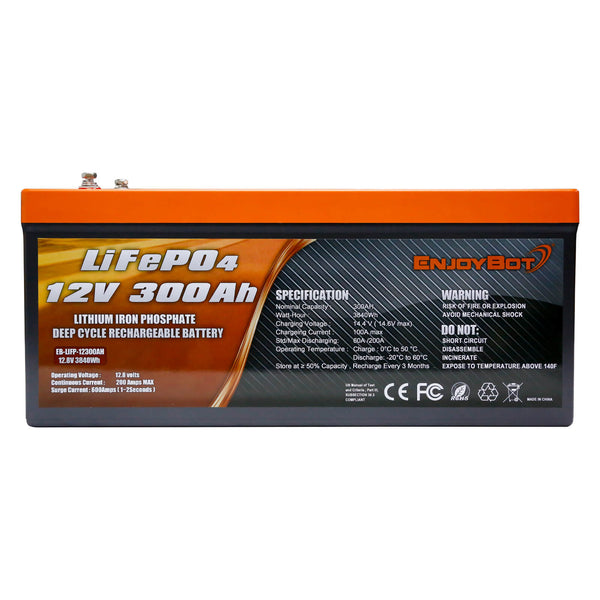
Conclusion
From all the above, we highly recommend Enjoybot lithium-iron phosphate (LiFePO4 or LFP) batteries. Whether you are heading out on the water for a fun day of cruising around the lake and ocean , trolling for a trophy fish, or living on your houseboat, choosing the best batteries for your use is critical. Understanding your applications and the benefits of the different options allows you to choose the best marine batteries for you.
















![[Upgraded Version] Enjoybot 14.6V 20A Waterproof Mountable LiFePO4 Lithium Battery Charger For 12V LiFePO4 Battery](http://enjoybot.com/cdn/shop/files/14.6V_20A_Waterproof_Battery_Charger_1_360x.jpg?v=1752565609)
![[Upgraded Version] Enjoybot 14.6V 20A Waterproof Mountable LiFePO4 Lithium Battery Charger For 12V LiFePO4 Battery](http://enjoybot.com/cdn/shop/files/14.6V_20A_Waterproof_Battery_Charger_2_360x.jpg?v=1752637374)















